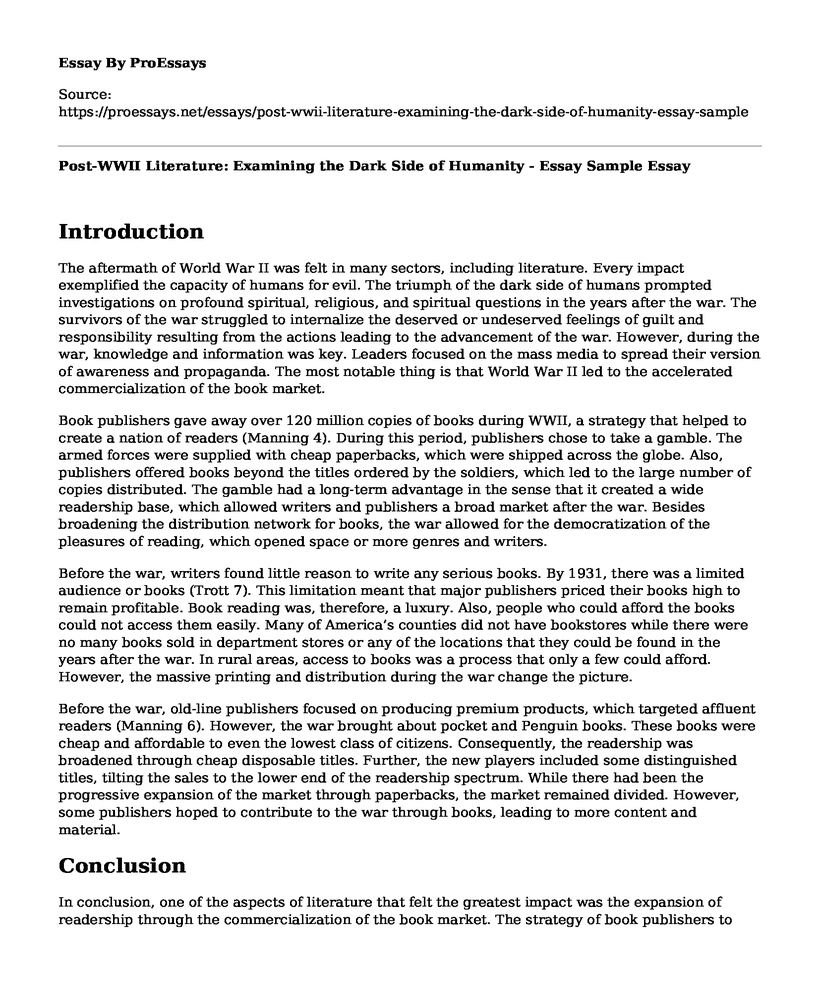Introduction
The aftermath of World War II was felt in many sectors, including literature. Every impact exemplified the capacity of humans for evil. The triumph of the dark side of humans prompted investigations on profound spiritual, religious, and spiritual questions in the years after the war. The survivors of the war struggled to internalize the deserved or undeserved feelings of guilt and responsibility resulting from the actions leading to the advancement of the war. However, during the war, knowledge and information was key. Leaders focused on the mass media to spread their version of awareness and propaganda. The most notable thing is that World War II led to the accelerated commercialization of the book market.
Book publishers gave away over 120 million copies of books during WWII, a strategy that helped to create a nation of readers (Manning 4). During this period, publishers chose to take a gamble. The armed forces were supplied with cheap paperbacks, which were shipped across the globe. Also, publishers offered books beyond the titles ordered by the soldiers, which led to the large number of copies distributed. The gamble had a long-term advantage in the sense that it created a wide readership base, which allowed writers and publishers a broad market after the war. Besides broadening the distribution network for books, the war allowed for the democratization of the pleasures of reading, which opened space or more genres and writers.
Before the war, writers found little reason to write any serious books. By 1931, there was a limited audience or books (Trott 7). This limitation meant that major publishers priced their books high to remain profitable. Book reading was, therefore, a luxury. Also, people who could afford the books could not access them easily. Many of America’s counties did not have bookstores while there were no many books sold in department stores or any of the locations that they could be found in the years after the war. In rural areas, access to books was a process that only a few could afford. However, the massive printing and distribution during the war change the picture.
Before the war, old-line publishers focused on producing premium products, which targeted affluent readers (Manning 6). However, the war brought about pocket and Penguin books. These books were cheap and affordable to even the lowest class of citizens. Consequently, the readership was broadened through cheap disposable titles. Further, the new players included some distinguished titles, tilting the sales to the lower end of the readership spectrum. While there had been the progressive expansion of the market through paperbacks, the market remained divided. However, some publishers hoped to contribute to the war through books, leading to more content and material.
Conclusion
In conclusion, one of the aspects of literature that felt the greatest impact was the expansion of readership through the commercialization of the book market. The strategy of book publishers to expand their distribution during the war permitted the subsequent expansion of the audience. The focus on the lower end of the readership spectrum also allowed publishers to grow a robust network, which proved essential in the later years. Increased access to literature material allowed readers to democratize their genres, and more authors to provide content. The struggle by leaders to control mass media was also important. The role of books in shaping communication and how the population perceives culture was important. A combination of these factors allowed publishers to distribute more and increased the demand for content.
Works Cited
Manning, Molly Guptill. When books went to war: the stories that helped us win World War II. Houghton Mifflin Harcourt, 2014.
Trott, Vincent. Publishers, Readers, and the Great War: Literature and Memory Since 1918, 2019. Print.
Cite this page
Post-WWII Literature: Examining the Dark Side of Humanity - Essay Sample. (2023, Aug 16). Retrieved from https://proessays.net/essays/post-wwii-literature-examining-the-dark-side-of-humanity-essay-sample
If you are the original author of this essay and no longer wish to have it published on the ProEssays website, please click below to request its removal:
- Poem Analysis Essay on The Rape of the Lock
- Thomas Jefferson Vs. Alexander Hamilton Essay
- Cyclops Essay Example
- Truth Telling and Commissions During a Time of War Essay
- The Fall of the House of Usher Analysis Paper Example
- Essay Example on Robber Barons: Self-Interest Leads to Generosity
- Essay Example on Elvira's Story: An Immigrant's Journey for a Better Life







